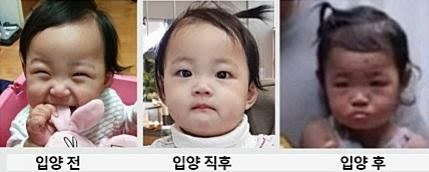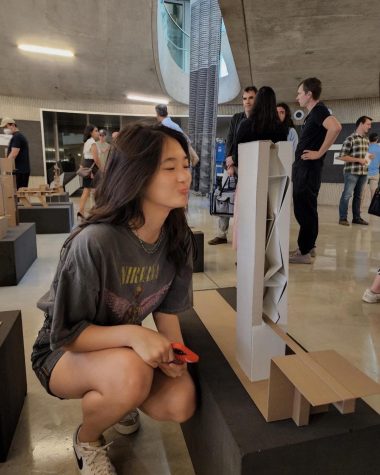Jeong-in’s death: Why the Korean police needs to do better in finding and prosecuting child abuse

This collage of photographs depicts Jeong-in’s gradual change in appearance before, right after, and during her adoption.
TRIGGER WARNING: Mentioning of death, murder, and abuse
Mok-dong, Yangcheon District. October 13, 2020. 16 months old. Bruises. Fractured bones. Head wounds. Ruptured pancreas. At barely 1 year old, a Korean baby by the name of Jeong-in tragically died in a hospital last year. Yet, her death was not inevitable. The Korean police were given not one, not two, but three chances to save Jeong-in from the very people who brought about her death, but the Korean police chose to ignore the signs of abuse that subsequently led to her undeserved end.
However, Jeong-in’s untimely death did not go in vain, but rather, her passing exposed the negligence of the Korean police force, the detrimental leniency of manslaughter laws in Korea, and the power of the public voice in times of injustice.
The sudden growing recognition of Jeong-in’s story began in Unanswered Questions’ January 2, 2021 episode when Unanswered Questions—a Korean TV program that critically analyzes and researches past and current mysterious or pushed-aside cases in Korea—unveiled details of Jeong-in’s case that had remained undiscovered and hidden from the public eye 3 months after her death.
Jang and Ahn, a married couple with a 4-year-old biological daughter, adopted Jeong-in from an orphanage in January of 2020. At this time, Jeong-in was 7 months old and weighed 9 kg. By the time of her death, Jeong-in was 16 months old and weighed 7 kg.
Even during the baby’s first few months with Jang and Ahn, signs of suspected child abuse became so evident that three different reports were made, all of which appallingly failed to incite action from the police.
In May, a worker at Jeong-in’s daycare center made the first report to Yangcheon Police Precinct after the woman found bruises on Jeong-in’s body. When questioned, Jang and Ahn told the police that they probably massaged the girl too hard, and, believing the parents, the police closed the case. Again, in June, the police received a report that Jeong-in was left alone inside a parked car. Once again, in September, a pediatrician who treated Jeong-in reported suspected abuse to the police. In both instances, the police closed investigations by claiming that they could find no evidence and did not separate the child from the couple.
Time and time again, the Korean police lost an opportunity to rescue a child clearly showing symptoms of mistreatment. The job of any police force is to keep peace, enforce the law, protect people from harm, and investigate crimes. Their indifference towards this matter illustrates the dire need for re-education and reformation of the police. Their unwillingness to follow the basic guidelines of their job ultimately cost the life of a little girl.
Soon after Jeong-in’s death, both Jang and Ahn were arrested for causing the death of their adopted daughter, the police finally making a move long overdue.
In November, one month after their arrest, the Seoul Southern District Prosecutors’ Office indicted the adoptive mother for involuntary manslaughter by child abuse and the father for negligence. The maximum punishment for involuntary manslaughter by child abuse in Korea is only 15 years in prison versus punishment for murder of a person younger than 13 years old is life imprisonment.
The indictment proposed by the prosecutor produced an uproar from the public and showed the people how outdated the rule of the criminal conviction law is in Korea. By appealing under involuntary manslaughter, the defendant is arguing that she accidentally killed the child. However, under murder, the defendant would be fighting against the fact that she knowingly abused the child to her death.
To make sure that Ahn got what she deserved, through the Blue House Bulletin Board (Cheong Wa Dae website)—a political communication system to address citizen concerns in South Korea where President Moon Jae-in can directly communicate with civilians—Koreans created a petition to upgrade the indictments to the second type of manslaughter: planned murder. For the petition to reach the President and Blue House officials, the petition must be recommended by more than 200,000 people over 30 days. The petition posted in regards to Jeong-in’s case received over 230,000 signatures as of December 20, 2020, meeting the requirements to reach the governmental level.
However, the people of Korea did not stop there: the viral hashtag, #Jeong-in-ah, I’m Sorry, circulated the internet, especially on Twitter, where BTS Jimin and many other celebrities helped the campaign to trend in real-time in order to gain the attention and awareness of international fans and prevent child abuse worldwide.
The voice of the public rang loud and clear, with even Rep. Noh Woong-rae of the ruling Democratic Party (DP) declaring that the party will revise the law to double the prison sentence for child abuse convictions. The party has already passed its first stage in making this amendment a reality.
Despite the pivotal moments that Jeong-in’s case brought to light, the actions of the police are by no means justifiable. Ministry of Welfare statistics shows that 81 percent of 22,367 child abuse cases ended with the child being sent back to the family. Between 1998 and 2016, the Korean Institute for Health and Social Affairs reported that only a quarter of convicted child abusers were sent to prison. Most received suspended sentences or fines.
If the aforementioned trends continue, more innocent children will be subjected to abuse without the hope of help from those who were stationed in their positions to protect and ensure safety for all.
As seen today in global and national events, the role of the police is becoming more questionable as more people have begun to realize the lack of basic education some of our protectors have. Take our own country for example. We are in the midst of a revelation—one that involves exposing the deep-seated pattern of police brutality in America. According to a Bureau of Justice Statistics report, 48 percent of police academies followed a military model, compared to18 percent that emphasized academic achievement. A third balanced the two styles (Reaves, 2016).
The police officers we see on our streets behave the way they do depend on the type of training they receive from these academies. The issue here is that we treat our police academies like a military boot camp rather than an institution prioritizing basic human empathy skills and knowledge about being an ally to the people. The weak curriculum of the police academy bleeds through the behavior of some of our police officers, and their actions ultimately cost innocent lives.
Abused children, like Jeong-in, are the inheritors of the future that we pass on, but what good is a good world, if there is no one to pass it to, and what good is it to bestow a world to these children, if the world they inherit is a world void of trust and guarantee of safety?
Your fellow classmate, younger sister, best friend, or even you could have been born into a domestically abusive household, yet those around you and you were luckier than children like Jeong-in. Hence, it is our responsibility as the lucky ones to ensure that these people, who had but no choice to live out the life that they had been given, are protected. It is our responsibility to encourage the Korean police force as well as any ill-educated protection force to re-understand their role in society and how they carry out their duties so that no more lives are lost at the expense of their inadequacy and that Jeong-in can rest in peace.

Yonu Oh '23 is the co-Editor-in-Chief of Counterpoint! Her current passion in life is to eat overnight oats and semi-patiently wait for the next season...


Shaneequa Jackson | Jan 23, 2022 at 12:15 pm
While it’s been over a year since Baby Jungin left this cruel, unjust world, the undescribable ire and sadness that overcomes me is just as profound and intense as it was upon first learning of her disturbing death and story. I never knew Jungin, her adoptive parents nor anyone else who played a role in her short life, and yet I continue to feel so very connected with her spirit and beautiful, divine energy. Her genuine smile and sparkling eyes and fat round chubby cheeks embodied a spirit that was more kind and compassionate and wise than most adults can ever aspire to be in a lifetime. I stand in solidarity with all the beautiful people of Korea and throughout the world who now share in the parental capacity for our dear sweet Baby Jungin.